- Home
- Victoria Aveyard
Broken Throne Page 16
Broken Throne Read online
Page 16
* * *
Must ask the premier to arrange a visit.
* * *
Montfort reportedly has the highest population of newblood citizens, though this number is impossible to ascertain as Silver-led nations either do not recognize the existence of newbloods or have not begun recording them. Many newbloods are refugees and are most likely to join the Montfortan military to defend their adopted home.
The Montfortan military, due in large part to the information kept in the vaults of Horn Mountain, is very technologically advanced. The Free Republic also champions military recruitment, and most citizens serve or served in the military in some capacity. The wars to form Montfort are fresh in most minds, and most citizens are eager to spread their way of life to their oppressed Red brethren. Montfortans share a pride in their country and its duty to free the world.
* * *
Like the Lakelands, CIRON is strongly rooted in religion, and the kingdom is both a monarchy and a theocracy. The monarch and the religious head, known as the Sun’s Voice, rule together. Before coronation, a prospective monarch of Ciron must be blessed and accepted by the Voice, which has resulted in several succession crises over the centuries. Ciron has the longest-standing monarchy on the continent, its dynasty stretching back more than a thousand years, when Silvers were fewer and were worshipped as gods in their lands.
The current king of Ciron is the burner ILFONSO FINIX, of the long-standing Finix Dynasty. The Sun’s Voice is the Silver woman SERANNA, a talented shadow of no noble bloodline. Both the crown and the religious post must pass to a burner and a shadow, respectively, for fire and light are the closest mankind comes to the sun upon the earth.
As in Montfort, the northwest coast of Ciron is subject to a large amount of volcanic activity. The large inland sea, known as the Lagamara, is sacred to Cironian religion as well as central to their economy. Its shores are incredibly fertile for agriculture, while a maritime fishing industry flourishes throughout the sea.
Reds work both farms and the sea, with their populations centered in the coastal fishing communities as well as on the city outskirts. While Reds are currently not forcibly conscripted into military service, Ciron has been known to do so in times of war. Because of the harsh climate of the Grand Desert, many Reds never attempt the crossing to Montfort, or they die trying.
Both the Sun’s Voice and the monarchy are based in the city of Solest, a holy place at the tip of the massive peninsula bordering the Lagamara. From there, residents can see both sunrise and sunset, and worship the sun at these holy times.
Due to both distance and the Grand Desert, Ciron is largely removed from the wars of the eastern countries. They treat mostly with Tiraxes along their southern border, and maintain a shaky neutrality with Montfort.
* * *
THE KINGDOM OF TIRAXES is a triarchy, with power vested in three scions of three Silver dynasties, who rule the kingdom together. Each King or Queen Triarch maintains his or her own lands, while decisions for the kingdom at large, such as whether or not to go to war, must be made unanimously. Because the kingdom is so vast, with varying weather and landscape, Reds outside the major settlements are often left alone by their Silver overlords. There are rumors of Red-only enclaves along the western border and deep in the southern desert.
* * *
So no decisions are ever made, then.
* * *
The Queen Triarch of the West, MAILUNA TORMAS, rules the desert, mountains, and grasslands west of the Rion Pecosa to the southwestern border with Ciron. She is a storm, like the rest of her line, an ability that allows her otherwise-barren territory to flourish beneath revitalizing rainstorms and floods. The Tormas line has transformed pieces of the Tiraxean desert over the last century, making them suitable for agriculture.
The King Triarch of the North is the blood healer AMBROSIN, who is well over one hundred years old but so skilled in ability that he has been rendered ageless and nearly immortal. Ambrosin is the son of Queen ANDURA CALORE, one of two women to have ruled Norta in their own right. Though he is the son of the queen, he inherited his father’s blood-healer abilities and was thus excluded from Calore succession. To acknowledge the house that denied him, he recognizes no last name and sought his destiny elsewhere. He rules from the Prairie border to the Rion Roja, and his capital, VIGIA, is often subject to attack from the Sandhills, raiders, or sometimes both working together.
BELLEZ ALLIRION, the Queen Triarch of the Midland, is the strongest of the three triarchs, ruling the majority of the Tiraxean population from her capital at Cuatracastela. Her territory stretches from the Tiraxean coast to the interior between the Rion Roja and the Rion Pecosa. Not only is she a talented eye, able to see the immediate future, but the Queen Triarch is famed throughout the southern territories for her beauty.
Tiraxes is the only nation to openly trade with the criminal syndicates of the Disputed Lands. King Triarch Ambrosin even has a treaty allowing his ships full movement along the Great River in tandem with the river smugglers.
* * *
THE DISPUTED LANDS are anarchy.
* * *
Tempting
* * *
WORLD BEHIND
ONE
Ashe
I’m only twenty years old, but I’ve seen countless rat days, as crew and as captain. They’re always the same.
This one starts like any other. Busy, stinking, noisy. A sea of faces and waving hands stretches across the ragged docks on the Lakelander side of the river, hundreds of mouths open in plea, fingers clutching full purses or useless stacks of paper currency. They beg in many voices, all asking the same thing. Take us away. Bring us downriver. Carry me west or south or north, in any direction but the one I have come from. Like rats on a burning raft, trying to scamper up the ropes.
Used to be only Reds who looked downriver, eager to leave the Silver rule of the Crownlands. Willing to brave the Freelands and the infamous Rivermen, seeking a better life than the one they left behind. Not anymore. There’s a war on, spreading like disease up and down the eastern kingdoms. Even Silvers are not immune to it. Fewer of them run, but the ones who do run the same as the rest of us. I find that comforting, somehow.
Most Rivermen are Reds. The few Silvers among us live farther south, on the Tiraxean border or in the few established cities on the Great River. They don’t bother this far north. Not worth their time or the risk of facing their kin. They’re self-obsessed cowards no matter who they pledge allegiance to, only willing to fight what they know they can defeat.
And many Red Rivermen won’t take Silvers on the boats. Most of us hate them, hate their abilities, hate who they are. They aren’t worth the trouble or the headache, no matter how well they pay.
Not me. There are no colors on a rat day. No Red or Silver. All that matters on my boat is coin.
I count quickly in my head, scanning the docks. I could book passage for six—they would fit even with the cargo I took on upriver at the border. Better if a few were small—young children. A family is best. One destination, more likely to work together, keep one another in check. Less chance of trouble. Easy job, easy river. My father’s old words rise like a Lakelander prayer, floating above the shouts across the water.
I lean against the rigging of my keelboat, eyes narrowed against the dawn slanting through the trees on the Lakelander bank. I venture at least two hundred souls hope for passage, ratting on the docks. With only three boats waiting, my own included, most will find their hopes unanswered.
This isn’t even one of the busy points of crossing, like the Geminas city port, the Memphia islands, the Gates of Mizostium, or the major confluences along the Great River. But this part of the Ohius has the closest public docks to the Rift border, a region now in open revolt against Norta. Red refugees and Silver deserters have flooded downriver over the last few months, like leaves on the current. Things must be going poorly in the east—because my business has never been better.
I prefer honest smug
gling to passenger work if given the choice. Cargo doesn’t talk back. Right now half my shallow boat is packed with crates, some stamped with the Nortan crown, others the blue flower of the Lakelander king and queen. I don’t ask what I transport, but I can guess. Grain from the Lakelands, slum-made batteries fresh from the Nortan factories. Oil fuel, bottles of alcohol. All stolen, to be handed off downriver south or upriver west. I wager I’ll replace them with crates stamped with the Montfort mountain for the return journey. Guns and ammunition come down the Ark River to the Great on seemingly every boat, bound for the rebels fighting in the northeast. The gun runs pay best, but they carry the most risk. Most Crownland patrols will let Rivermen pass for a bribe, but not if you’re carrying weaponry. That’ll earn you a bullet if you’re lucky, or Silver torture if the patrols are feeling bored.
No guns on my boat today, except for the ones my small crew and I carry. The Freelands are no place to travel unarmed.
The other two keelboats, shallow as my own, built to ride strong currents and ford the changing depths of rivers and streams, wait off the starboard side. I know their captains, and they know me. Old Toby waves from the prow of her boat, a red patchwork scarf tied around her neck despite the humidity of early summer. She’s taken up with the Scarlet Guard and works almost exclusively for them now. She must have an arrangement waiting to board her boat. Guard operatives or the like, catching transport to river knows where.
I shake my head. Not worth the trouble, those Guard folk. They’ll get you killed quicker than a gun run.
“You want to pick your rats first, Ashe?” the other captain, Hallow, calls to me from his deck. He’s my age and lanky as a scarecrow, taller than I am, but I don’t mind. I prefer muscle to height. Hallow is fair where I am dark, brown all over from my hair to my eyes to the river-worn, scarred, tanned hands in my pockets. Our fathers worked together downriver at the Gates. They died together too.
I shake my head. “It’s your turn,” I reply, grinning at him. I always give Hallow first pick, ever since we both earned our own boats two years ago.
He nods to me, then to his crew. They jump to action, a pair of them using the long poles to direct the keel into the center of the river, where the water is deepest and the current flows true. The third, his scurrier, hops into the scurry, the smaller boat lashed to the side of the keel. With sure hands, she unties the scurry and paddles her way to the docks, careful to stop a few yards out of reach.
While the Lakelander regulations don’t impede our work, they don’t make it easy for us. No Riverman is permitted to set foot on their side of the river, where the border is starkly drawn. We must do our business on the water, or on our side of the bank. There isn’t a patrol at this dock, or even an outpost, but it’s best to take all precautions. Times nowadays are as unpredictable as the spring melts.
The scurrier shouts at the jostling horde of rats on the shore, beginning the back and forth of bargains. She keeps her gun ready, in plain sight of the crowd. Fingers are held up, coins brandished, paper notes from all over the Crownlands flutter on the breeze. She signals to Hallow with her hands, using signs we all know well, and he signals back. After a moment, three Reds jump into the shallows, laden with packs. They look like siblings, reedy teenagers. Probably outrunning conscription in Norta. Merchant class, with parents who love them and enough money to bribe their way to the border and onto a keelboat. Lucky bastards, I think. Usually conscription runners have little to offer, and sometimes they have a Silver patrol hunting them down for good measure. I hate taking on runners and deserters. Hard job, hard river.
Soon Hallow has his passengers, hustled back in the scurry. He must be smuggling a good amount of cargo today, to only take three on board. Our keels are the same size, and I wonder what he’s got in his hold. Hallow isn’t as careful as I am. He lets the river take him where it wills.
He smiles at me with a flourish, showing the golden tooth where a canine incisor should be. I have the same, the other half of a matching set. “Got them all thirsty for you, Captain,” he calls over the constant rush of the river.
I nod to my crew, and the keel moves beneath me, taking Hallow’s place.
My scurrier, Big Ean, is already in his little boat, his broad frame taking up nearly half the scurry.
“Six,” I mutter down to him, leaning over the side. “You know what I prefer.”
He just waves a hand and grunts, pushing off the keel with his paddle. With a few powerful strokes, he maneuvers the scurry to the opposite end of the docks from where Hallow drew his rats.
I stare after him, shading my eyes with a hand. From the center of the river, I can hunt the faces myself, looking for good jobs. Easy river.
A group of four stands out on one end of the dock, wrapped in matching blue cloaks hemmed in mud. I glimpse uniforms on the two women clutching each other and two children. The adults clearly maids from a fine Silver household. They’ll have money certainly, if not something more valuable to trade. Stolen jewels from their master, adorned knives from a mistress.
I signal to Big Ean, gesturing for him to approach them, but he’s already focused on another rat planted in the shallows. Though dozens of the rats beg, bending toward him to plead their case or bargain, he gestures to one figure in the crowd. I squint, trying to assess the rat as best I can from my place at the prow.
Tall, hooded in a filthy coat too big for her frame. It nearly trails on the ragged docks. Nearly.
The coat doesn’t quite hide the polished leather boots, well fitted and well made.
My jaw tightens as a real gold coin flashes between her fingers, catching the dawn light.
Someone bumps her shoulder hard, fighting for Big Ean’s attention, but she doesn’t budge, unmoved. She says something to Big Ean that I can’t hear.
Big Ean looks back to me. She’ll pay ten times the rate, in gold, he signals.
Take her, I signal back with ease.
With a wave of his hand, he passes on the message and she leaps from the dock, landing hip deep in the water without hesitation. In an instant she climbs onto Big Ean’s boat, settling into her coat despite the rising heat. I catch a glimpse of straight, gleaming black hair beneath the hood before she tucks it back.
My stomach twists, a familiar dread settling in me. I suspect already—but I won’t know for certain until I can look her in the eye.
As with all fat rats, the kind who pay more than they should for what we offer, Big Ean ferries her back alone, without filling the rest of the scurry. I need to assess her, figure out why she’s throwing so much gold away on a few days’ journey. And if she’s worth the risk of transport. If not, I’ll toss her back in the river and leave her to ratting on the shore.
She climbs from the scurry to the keel deck without aid, dripping water everywhere. The coat stinks close up, like sewage. I wrinkle my nose as I approach her, gesturing for Big Ean and my polers, Gill and Riette, to stand aside. She doesn’t drop her hood, so I yank it back for her.
Silver veins her eyes, and her skin is cold bronze. I try not to flinch.
“Half the gold now, half at the Gates” is all she says, her voice softened and slowed by a butter-rich Piedmont accent. Freckles dust her cheeks, a spread of stars beneath her angled, black eyes. “Is that suitable?”
She’s educated, rich, and noble, even with the disgusting coat. And she wants to go all the way to the end of the line, to the Gates of Mizostium, the place where the Great River meets the sea.
I clench my jaw. “What’s your name and what’s your business on the rivers?”
“I’m paying you for transport, not questions,” she responds without hesitation.
Sneering, I wave a hand back to the scurry. “You can find another keel if my terms don’t agree with you.”
Her reply is whipcrack fast. Again no hesitation. No second-guessing herself. I wonder if she even knows how to do so.
“My name is Lyrisa,” she says, chin still high. Her eyes rake over me. I get the fee
ling she’s looked down on men like me all her life. “I am a blood princess of the Lowcountry, and I need to be at the Gates of Mizostium as soon as possible.”
I almost toss her back into the river then and there. Only the danger of her ability, trained and lethal whatever it may be, stills my hand. Behind her, Gill tightens a grip on his pole. As if he could simply strike her and be done with it. Riette is more intelligent. Her hand goes to the pistol on her hip, unfastening the button keeping it holstered. Even Silvers aren’t immune to bullets. Most of them, anyway.
I wish I could touch my own gun, but she’ll see me do it. “Who, and more importantly how many, of your father’s Silver hunters are following you?”
Finally she wavers, if only for a moment. Her eyes drop to the deck, then blaze back to mine. “My father is dead.”
A corner of my mouth lifts in a cold smirk. “Your father is the ruling prince of Piedmont, currently at war with the Rift. We Rivermen aren’t as stupid as you think we are.”
“Bracken is my uncle, my mother’s brother,” she snaps. Her eyes narrow, and I wonder what her ability could be. How many ways she could kill me or my crew. How someone like her could possibly need us to get downriver—or why. “My father is dead, for six years now. I did not lie and I resent the implication, Red.”
Despite her blood, her Silver-born tendency to lie, cheat, and abuse us, I can’t see a lie in her eyes or hear it in her voice. She doesn’t flinch under my inspection. “How many hunters?” I ask again, leaning toward her, though all my Red instincts cry out in protest.
Lyrisa doesn’t move, neither retreating nor meeting my challenge.
“None. I was journeying north into the Lakelands with a convoy when we were attacked by rebels.” She jabs a thumb over her shoulder at the bank. A breeze stirs her hair, blowing a gleaming, thick curtain of black over one shoulder. “I am the only survivor.”

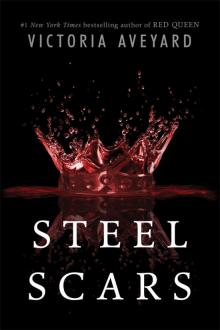 Red Queen Novella #2
Red Queen Novella #2 Red Queen Novella #1
Red Queen Novella #1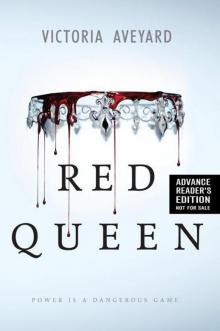 Red Queen
Red Queen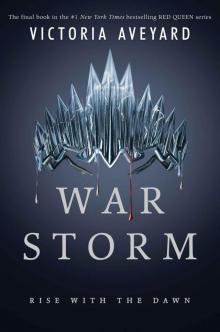 War Storm
War Storm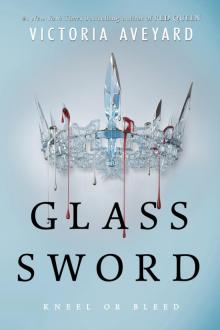 Glass Sword
Glass Sword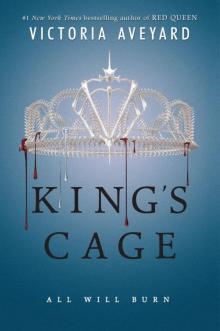 King's Cage
King's Cage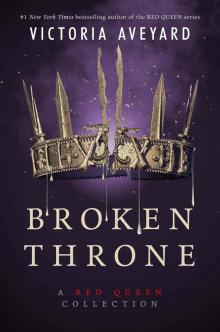 Broken Throne
Broken Throne